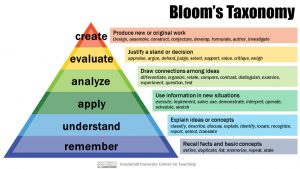
Bloom’s Taxonomy – good critical thinkers travel up towards the pointy end.
The New Zealand Curriculum defines critical thinking as “examining, questioning, evaluating, and challenging taken-for-granted assumptions about issues and practices” and critical action as “action based on critical thinking”
As scientists, we need to be thinking and acting critically in order to ensure that the most evidence based and experimentally supported theories and ideas are being moved forward. Much has been written about how to teach, particularly science students to think critically (You can start travelling down that rabbit hole here)
Unfortunately, especially in high school, many students are driven by credits, exams and assessment and so knowing the “right answer” sometimes feels more important to students than critically thinking about the presented information to form their own answer. Another issue is that thinking is very hard to assess – because it goes on in the students’ minds, it is often difficult to see how they arrived at an answer and instead just assess the answer itself.
Critical thinking is an important skill to learn though, in this increasingly data driven world, we are evaluating information almost constantly. Learning how to separate the “wheat from the chaff” will help us make more informed and evidence based decisions, as well as stopping us from falling for “Fake News” 🙂
The scaffolds in Knowledge Forum are designed to help with this. By making your thinking explicit, you are not only showing that you are examining evidence and thinking critically, you are also able to think about your own way of thinking and evaluate the way that you are approaching information.
It has been agreed that the most effective way to improve your critical thinking is to practise. In Knowledge Forum, the scaffolds are an easy way to help you do this. In school, think about applying those same questions to your schoolwork. Every lesson is a new theory, now you need to find the evidence to support new theory and build your knowledge of the topic. Building your critical thinking skills will help your understanding of the topic and enable you to access those excellence and beyond grades.
 6 minutes wasn’t long enough to get a science message across to a public audience.
6 minutes wasn’t long enough to get a science message across to a public audience.






Recent Comments